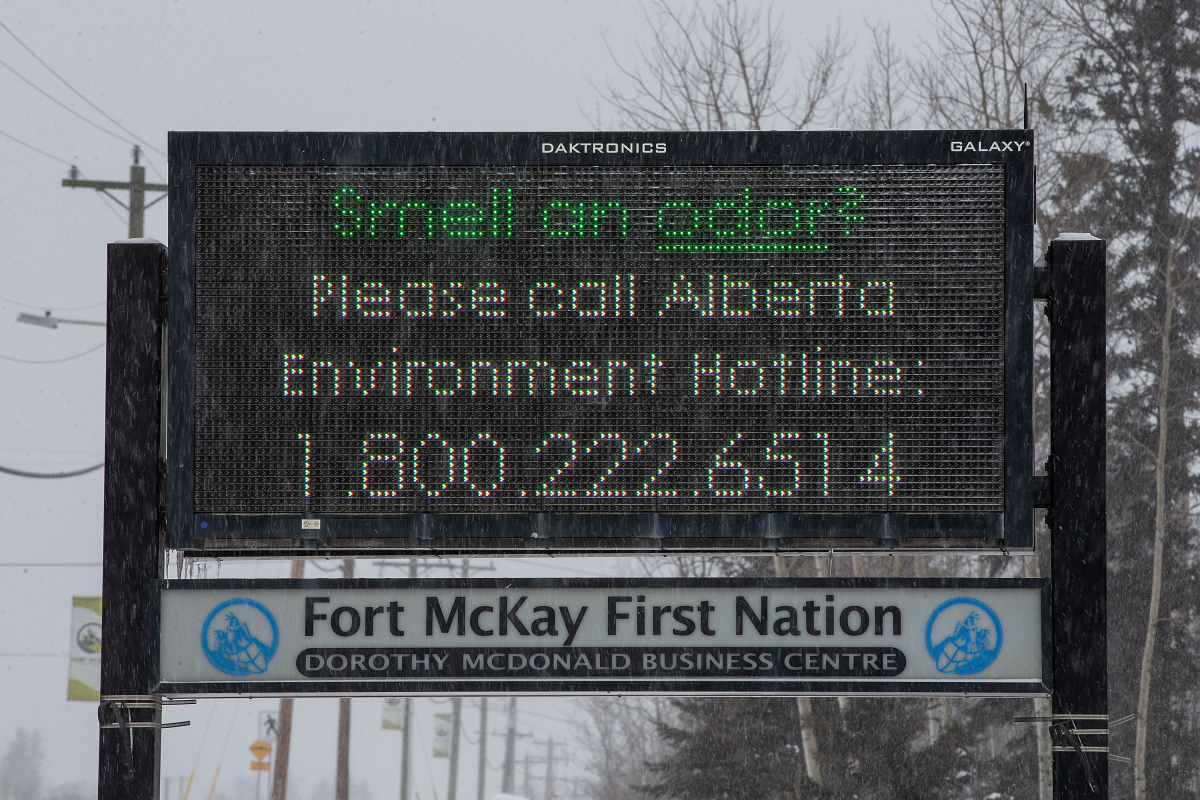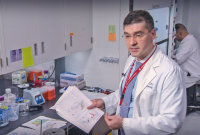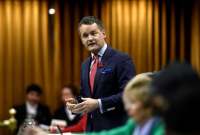Support strong Canadian climate journalism for 2025
Indigenous communities in Canada are “disproportionately impacted” by toxic industrial byproducts to the point that it raises questions of discrimination, a UN investigator said Thursday in Ottawa.
Baskut Tuncak, the UN's special rapporteur on human rights and hazardous substances and wastes, spent two weeks touring Canada and visiting First Nations living close to industrial developments or dealing with the repercussions of toxic waste.
He called the situation of Grassy Narrows First Nation in Northern Ontario, which has dealt with mercury contamination in its water system, a failure of government and the condition of Aamjiwnaang First Nation near chemical plants in Sarnia, Ontario “deeply unsettling.”
Tuncak also said he was "troubled" that the government had not prosecuted Volkswagen Group and others for the dieselgate scandal years after it was revealed. And he said the situation in Fort McKay and other oilsands communities “paint a disturbing picture of health impacts" that also “cannot be divorced” from the Trans Mountain oil pipeline expansion project.
His findings are consistent with investigations by National Observer collaborating with Global News and the Toronto Star into concerns surrounding toxins and environmental problems in Sarnia and Fort McKay, Alberta as part of the Price of Oil series.
“There’s certainly progress that has been made within the country," Tuncak offered during a press conference Thursday on Parliament Hill, "but one of the lingering questions in my mind is a question around discrimination — and to what extent Canadian laws and practices are providing equal protection to groups that are especially vulnerable to hazardous substances and wastes."
He said he would be presenting a comprehensive report to the UN human rights council next year, and "one of the key issues that I’ll be focusing on is this question of discrimination, and the principles of non-discrimination and equality that underpin human rights.”
Tuncak highlighted his preliminary findings the same day NDP MP Linda Duncan’s bill to enshrine environmental rights in Canadian law had its first hour of debate in the House of Commons.
Bill C-438 would “give Canadians the right to access environmental information, participate in decisions impacting their environment and hold the government accountable through calling for investigations and judicial reviews,” Duncan said in a statement Thursday.
The bill is supported by the Trudeau government. But is unlikely to clear the House of Commons before it breaks in a couple weeks for the summer and the fall election.
It represents the fourth time in 11 years that Duncan has tried to shepherd environmental rights legislation through Parliament — and the last time she will do so as a federal politician, given that she is not seeking re-election.

Sarnia: 'One of the most polluted places in Canada'
Tuncak, an attorney and chemist who has worked for biotechnology companies as well as non-profits, was first appointed to the UN position in 2014. He has founded an advisory firm on human rights and sustainable development called Common Rights.
His official visit to Canada between May 24 and June 6 was to examine how the government has taken steps to protect human rights when it comes to toxic waste. His findings will be used to produce a report to be presented in September 2020 to the Human Rights Council.
“It was my observation that Indigenous peoples are disproportionately impacted by the toxic byproducts, the hazardous substances and wastes that are used, produced and released by economic actors,” Tuncak said Thursday.
Sarnia's manufacturing sector, referred to as Canada’s Chemical Valley, has “strikingly high” rates of acute myeloid leukemia, according to a peer-reviewed study reported on as part of an investigation by National Observer and Global News.
Residents in the city have been complaining for years about public health concerns related to industrial pollution. Environment and Climate Change Canada air monitoring data released to Global News showed elevated levels of the carcinogen benzene in Aamjiwnaang First Nation in 2017, at three times the regulated annual limit.
Tuncak's examination of the conditions surrounding Aamjiwnaang led him to describe the area as "one of the most polluted places in Canada," saying existing regulations are insufficient and "there remains considerable room for improvement to investigate health impacts, conduct proper monitoring, and enforce of existing standards."
"The condition of the Aamjiwnaang First Nation in Sarnia is deeply unsettling," Tuncak wrote in his preliminary findings.
"Deeply connected with their land, residents on the reservation are now surrounded on three sides by over 60 industrial facilities that create the physiological and mental stress among community members regarding the risk of impending explosions or other disasters, as well as a wide variety of health impacts from unquestionably poisonous chronic exposures."

Grassy Narrows: 'Cruel mental and physical impacts'
The drinking water of Grassy Narrows, a First Nation north of Kenora, was contaminated in the 1960s when a paper mill dumped thousands of kilograms of mercury in the English and Wabigoon Rivers. The World Health Organization says mercury can create toxic effects on the nervous system as well as digestion and immune systems, and hurts eyes, lungs, skin and kidneys.
The federal government promised a mercury treatment facility in November 2017, and has produced a feasibility study for that, according to The Canadian Press. Grassy Narrows First Nations Chief Rudy Turtle has called on the government to put $88.7 million, the facility's estimated cost, into a trust fund ahead of the election.
But a recent visit by Indigenous Services Minister Seamus O'Regan failed to produce an agreement for a path forward for the facility. Tuncak said he had heard frustration from members of the community and noted that suffering over mercury contamination continues. While this should have been a high priority for government, he argued, he said there has instead been “inaction.”
“I was quite disappointed with the answers that I was receiving regarding why, for over 50 years this community has not had the right to an effective remedy (from) one of the most toxic, most widely known substances,” said Tuncak.
In his preliminary findings, Tuncak said the case of Grassy Narrows, White Dog and other First Nations in northwestern Ontario is "emblematic of inadequate guarantees to secure an effective and timely remedy."
"The government has failed to answer why for 50 years it has not remediated 10 tons of mercury contamination in a local river, contaminating traditional foods, decimating the Indigenous community’s economy and subjecting generation after generation to cruel mental and physical impacts," he wrote.
On Thursday, Turtle appeared in Ottawa and reiterated his call for support.
“It’s been too long, and we need this facility. Our people are still suffering — even while I’m speaking today, there’s people suffering in my community," he told reporters outside West Block on Parliament Hill. "Put this in a trust fund, and let’s do what we’re supposed to do. Let’s do what’s right for Grassy Narrows.”
He said Tuncak's findings showed that "Canada hasn’t lived up to its obligations when it comes to human rights. The fact that they’ve kept this on the back burner for 50 years, it’s just not right.”
The government has said it will continue to work with Grassy Narrows to hammer out a deal on the facility.
Prime Minister Justin Trudeau has taken heat over his government's approach to Grassy Narrows, including an unusually confrontational remark he made in response to a Grassy Narrows advocate who attended his $1,500-a-ticket Liberal Party fundraiser in Toronto on March 27 and then raised a banner about mercury poisoning in the community.
Instead of addressing the issue, Trudeau sarcastically thanked the protester for attending the fundraiser. "Thank you for your donation," he said as the advocate, a woman was removed from the premises. "I really appreciate your donation to the Liberal Party of Canada."
He said sorry for his remarks a day later, saying democracy should allow for respectful, positive dialogue on issues and "I didn't do that...I lacked respect towards them and I apologize for that."

Dieselgate: 'There appears to be no excuse'
The so-called dieselgate scandal dates to 2015, when it was revealed that Volkswagen sold millions of diesel cars that had been fitted with “defeat devices” that changed how the car operated when they were being tested for emissions. Other car companies Mitsubishi, Daimler, Mazda and Honda faced similar revelations.
The issue surrounding diesel and air quality matters because Toronto and Canada are some of the top jurisdictions in the world with high rates of childhood asthma linked to vehicle pollution. Canada has the third highest rate of new cases, behind Kuwait and the United Arab Emirates, according to research published this spring.
The pollutant that is being linked to the asthma cases, nitrogen dioxide, is produced mostly by diesel vehicles. The dieselgate scandal showed many vehicles are producing more of this pollutant than is permitted.
On Thursday, Tuncak said he was “concerned about the lack of action to prosecute Volkswagen Group and other companies that are implicated in cases where Canadians have been exposed to toxic chemicals or illegal conduct.”
"I was equally troubled to hear of four years of government inaction to prosecute the Volkswagen Group and other actors for possible criminal conduct," reads Tuncak's findings.
"Concern was raised about the failure of authorities to take action on reports of false reporting of emissions of Volkswagen cars, even in light of legal provisions for investigation and enforcement...there appears to be no excuse for the government not to pursue justice and redress in this egregious case of corporate misconduct."

Oilsands: 'Mountains and lakes of waste'
A National Observer / Star Calgary investigation found that tens of thousands of barrels of petrochemicals had been released into a waste pond in 2016 near Fort McKay, a few kilometres away from a major oilsands plant, after the Fort McMurray wildfire.
The chemicals created a toxic air plume containing hydrogen sulphide, which can cause respiratory issues or death at high concentrations, and other compounds harmful to health like toluene and benzene.
Tuncak wrote in his preliminary findings that "the sheer enormity of extraction of oilsands in Alberta cannot be understated."
"Whether from the perspective of impacts on the stability of the climate, the mountains and lakes of waste being generated or the impacts on health of the community, nothing illustrates the ease by which the concept of ‘sustainable development’ is often perverted and emptied of meaning quite like the ‘tar sands,’” he wrote.
“Fort McMurray, Fort McKay and Fort Chipewyan paint a disturbing picture of health impacts of the tar sands that have not been properly investigated for years, and government inaction despite increasing evidence of health impacts on local communities."
He also noted how the federal government has been unable to "confirm whether or not massive tailings ponds are seeping into local water supplies, which raises obvious concerns regarding the enforceability of environmental protections."
Local communities say they can't access traditional foods or water sources and cite reports of sick animals, tainted meat and mutated fish, he said.
“The situation of the oil sands and indigenous rights cannot be divorced from the troubling and strenuously opposed Trans Mountain Pipeline Expansion Project, which would also impact the lands and waters of Indigenous peoples from Alberta to British Columbia," added Tuncak.

Bill of rights: 'I want governments to commit'
Tuncak also said one of the concerns that was repeatedly raised to him was how Indigenous and environmental rights defenders “continue to be harassed or persecuted in exercising their rights.”
That’s one of the reasons why an environmental bill of rights is needed federally, Duncan said Thursday. The bill “legally safeguards the right of all Canadians to a healthy and ecologically balanced environment and requires the government of Canada to protect those rights,” she said in a statement.
Duncan pointed to an op-ed published in The Hill Times this week by three chiefs in the area of Northern Alberta. The chiefs wrote that the oilsands is the only employment and economic activity in the area, and that they wanted to be able to participate in decisions that affect how contaminated water is dealt with in the region.
“This is a perfect example of the need for an environmental bill of rights,” she told the House of Commons. “If we had an environmental bill of rights, those communities would have the right to all that information, the right to the process that is going on, and the right to have a seat at the table in determining whether or not that is a wise decision.”
Duncan, Alberta's only NDP MP, has represented Edmonton-Strathcona since 2008 and was elected three times. She said last August that she would not be seeking re-election: "I think I've done my bit," she said at the time.
She first tried getting an environmental bill of rights through Parliament in 2009. The bill went to committee, where she told National Observer Thursday that "both Liberals and Conservatives basically shredded the bill." It survived to third reading before the government fell for an election.
"I tabled it again in successive parliaments. I've tabled it twice in this Parliament," she said, because the bill's drafters wanted to keep it current. She said she wasn't even sure she would have the chance to debate her bill this time around.
“I would have been delighted if the last two governments — the (Harper) Conservatives and the (Trudeau) Liberals — had taken my bill and enacted it, a whole environmental bill of rights," she said.
“My private members' bill is a place card. It gives the framework. It’s now endorsed globally as the way to go forward, and nobody’s going to be happier than me if everyone puts this in their platform...I want governments to commit starting late October next year, let’s table that as the first bill."
The Liberal Party membership also backed the idea of an environmental bill of rights at its April 2018 convention.
Sean Fraser, parliamentary secretary to the minister of environment and climate change, said Thursday in the House that the Trudeau government is “supportive” of the bill and has agreed to send it to committee for study.
“It is deserving of an analysis so that we can better understand how adding a level of justifiability to environmental protections would enhance the quality of our environment for Canadians,” he said.
But he acknowledged “there is a limited amount of time in this Parliament.” The House of Commons is scheduled to rise on June 21 and isn't expected to return until the next party forms government in October.







Comments